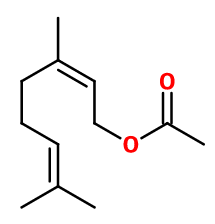
Photo credits: ScenTree SAS
Do you sell any of the raw materials? Would you like to let our users know?
Send an email to fournisseurs@scentree.coto learn about our advertising opportunities.
Do you sell any of the raw materials? Would you like to let our users know?
Send an email to fournisseurs@scentree.coto learn about our advertising opportunities.
General Presentation
-
CAS N° : 141-12-8
-
EINECS number : 205-459-2
-
FEMA number : 2773
-
FLAVIS number : 09.213
-
JECFA number : 59
-
Appearance : Colorless liquid
-
Density : 0,905
-
Volatility : Heart
-
Price Range : €€
Physico-chemical properties
-
Molecular formula : C12H20O2
-
Molecular Weight : 196,29 g/mol
-
Log P : 3,98
-
Fusion Point : Donnée indisponible.
-
Boiling Point : 238°C
-
Detection Threshold : Il peut aller de 2 ppm à 8,5 ppm (0,00085%)
-
Optical rotation : Donnée indisponible
-
Vapor pressure : Donnée indisponible
-
Refractive Index @20°C : Donnée indisponible
-
Acid Value : Donnée indisponible.
-
Flash Point : 100°C
Uses
Uses in perfumery :
Neryl acetate is used in neroli and rose floral accords to bring a fruity-floral nuance.
Year of discovery :
Data not available.
Natural availability :
Neryl acetate is present in several citrus fruits and Petitgrain Bigarade EO, from which it can be extracted to obtain natural Neryl acetate. Although its price is high as it is present in small quantities in its natural state.
Isomerism :
May contain traces of Geranyl acetate. Both diastereoisomers have a similar smell, although more terpenic, less powerful and lemony for Neryl acetate. Linalyl acetate, Terpenyl acetate and Isobornyl acetate are isomers of Neryl acetate. However, Linalyl acetate and Terpenyl acetate are reminiscent of Bergamot EO and Isobornyl acetate of pine.
Synthesis precursor :
Neryl acetate is not a precursor to the synthesis of another compound of olfactory interest.
Synthesis route :
Neryl acetate can be synthesized from Nerol by an esterification reaction using acetic acid or acetic anhydride, or from Myrcene, in two stages: an addition reaction with acid hydrochloric acid, catalysed by copper chloride II, followed by an acetolysis reaction using sodium ethanoate and a base such as triethylamine. This reaction allows to obtain both (Z) Neryl acetate and (E) Geranyl acetate, two diastereoisomers.
Regulations & IFRA
Allergens :
This ingredient does not contain any allergen.
IFRA 51th :
This ingredient is not restricted for the 51th amendment

